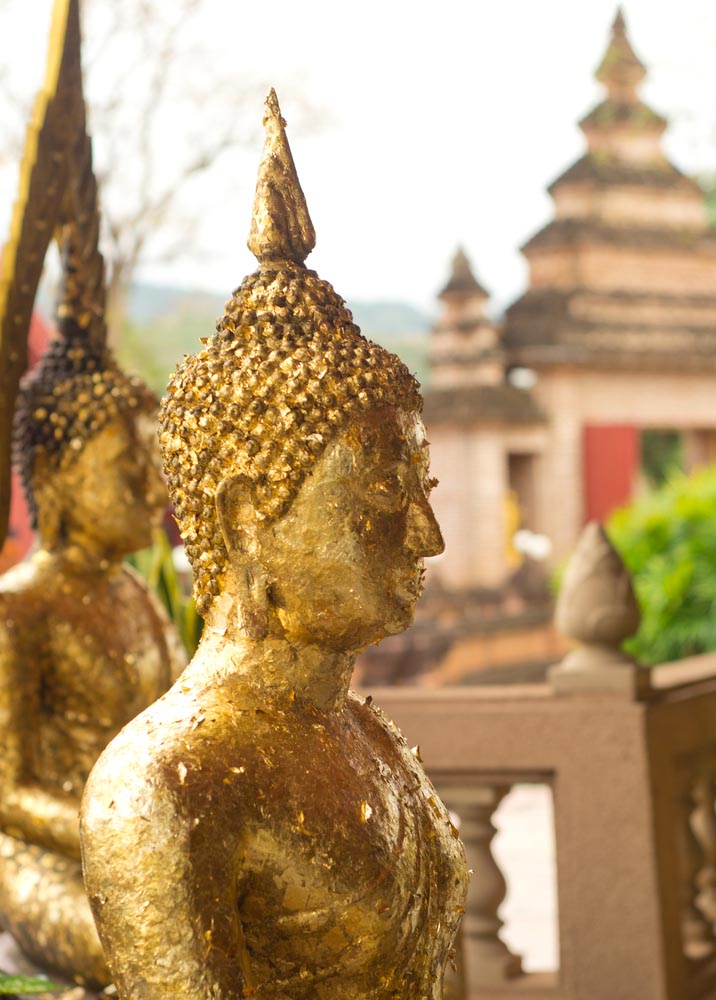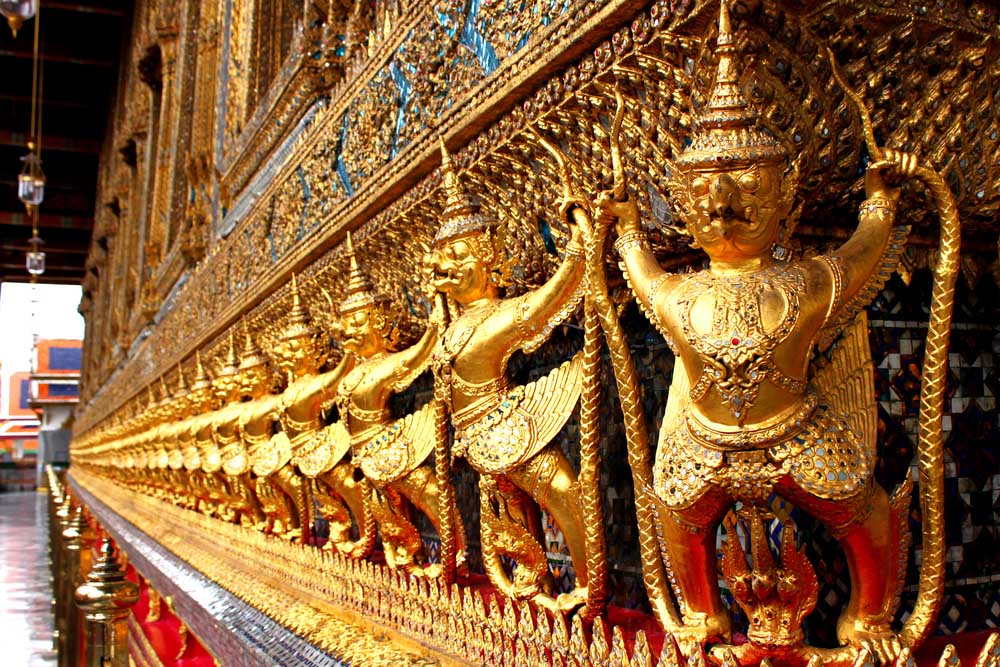“Can The Relationship Between You and Your Thai Love Really Work? Or Are You Just Fooling Yourself?”
"In this 7-part series Nathamon reveals the secrets of why some Western - Thai couples enjoy loving, life-affirming relationships -- while others crash and burn in bitterness. Understanding these secrets will give you the keys to unlock true passion and intimacy – and rejuvenate your love life!”
Part 3: The Avoidance of Uncertainty – What your Thai partner will NEVER tell you
In the last issue, I shared the second key to understanding what makes your Thai lady “tick:” that of “personal power” and how differently it is expressed in your respective cultures. Understanding the power dimension of culture will help you understand that her quiet, demure and deferential behavior is an expression of respect for you and the position you hold in her life.
And understanding the power dimension will also help you see how critical it is for you to be gentle, patient and kind, because abusing the power you hold in the relationship can earn you open rebellion – if not violence – once her “line” has been crossed.
In this article, I’ll share with you how your culture and the Thai culture deal so differently with the idea of “uncertainty” – and I’ll explain how understanding that difference will help nurture a sustaining, life-affirming relationship – and maybe even spice up your love life!
The Third Key: Uncertainty – Is it something to worry about or is it just a fact of life?
“How can she jump on the back of her brother’s motorcycle, sit sideways in her business suit and high heels, and zoom through Bangkok’s crazy traffic – not to mention without a helmet?”
“Why does she have to leave that food out overnight and burn incense in front of her dead mother’s picture every single day – she’s been dead for over 10 years!”
“How on earth am I supposed to tolerate it when she laughs inappropriately at the misfortunes and accidents of my friends? It’s embarrassing – and it seems almost cruel.”
Is this relationship doomed to failure? Maybe. But as soon as you understand that each of you looks at and deals differently with life’s uncertainty, you’ll be able to talk – and maybe even laugh – about the way you were each trained to cope with feeling “out of control.” Just like in the previous two articles, it’s not about who’s right and who’s wrong – it’s cultural.
All cultures view uncertainty and risk differently. Most cultures use a three-fold approach to “manage” the stress and anxiety that comes with the uncertainty of everyday life: technology, rules and regulations, and religion.
If you were raised in Australia, Canada, the U.S. the U.K., or other Anglo-Celtic culture, chances are you don’t tolerate “uncertainty” or the inability to control your circumstances very well. Your culture probably uses rules, laws, and technology to help people cope. As an example, you might come from a place where there are laws designed to protect you– motorcycle helmet laws, food safety regulations, guard rails on the highway, zoning restrictions in buildings and neighborhoods – all kinds of rules and regulations and laws to keep you “safe” from accidental harm.
In Thailand, you can ride without a helmet, sell your own food by the side of the road, and raise chickens in your back yard no matter where you live – there aren’t hundreds of laws and dozens of government agencies whose only job is to keep you safe. Thais know that life is inherently dangerous – and it’s your “karma” to take whatever misfortune comes. You see, in Thailand, the anxiety and stress about the uncertainty and unpredictability of life are most obviously managed by religion – in particular, the Buddhist way of looking at the world.
The Thai way to deal with the uncertainty of Life: Buddhism 101
Now I don’t want this little article to be a full course on Buddhism, but understanding the basics might just help you understand some of the “odd” things you think your Thai partner is doing – the little rituals she engages in, the shrines she puts up around the house, or even the way she reacts when unexpected things happen.
Buddhism has at its heart, four basic premises – called the “Noble Truths.” They are:
- All life is suffering.
- The cause of all suffering is desire.
- Therefore, the cure for suffering is to eliminate desire.
- The way to eliminate desire is to follow “The Eightfold Path.”
The Eightfold Path is the practice of:- Right Understanding
- Right Thought
- Right Speech
- Right Action
- Right Livelihood
- Right Effort
- Right Mindfulness
- Right Concentration
Another essential piece of Buddhism is the Law of Karma – the idea that your present condition (whether you’re happy or suffering) is a direct result of all of your past actions. If bad things are happening to you, it’s the result of your past bad actions. If you focus on doing good things, you can improve your chances of good things happening to you. I know it sounds simple – but it’s pretty similar to the Christian idea that you “reap what you sow” and the law in physics that says for every action there is an equal and opposite reaction. In other words, it’s the law of cause and effect, or balance.
And perhaps more interesting is the idea that there are six “realms” of existence – gods, demigods, human beings, animals, hungry (or restless) ghosts, and the hells. That means that everything has a life essence – the Buddha, the minor gods, people, cows, flies, ants, trees, tomatoes, grass, dead ancestors, rocks, mountains…everything is alive. It is part of the cycle of life, and the law of Karma implies that a life form is where it is because of some past action. The only way to elevate your position in the cycle of life is through improving your Karma.
So what does this mean about you, and your relationship with a Thai lady?
When you’re in Bangkok – or anywhere else in Thailand for that matter – you’ll notice little shrines to the Buddha on virtually every street corner. You’ll see Thai people almost unconsciously making a “wai” every time they pass one. That’s a way to practice “right mindfulness” to stay focused on the Buddhist idea of eliminating desire.
You might also notice little “houses” that look almost like mailboxes or birdhouses in everyone’s garden or terrace. Those little houses are for the spirits – the gods, demigods, and ghosts that to Thai people are very real and very present. And beyond the spirit houses, Thai people are very precise about what can or cannot be planted in the garden or on the terrace, as certain plants attract more unpleasant spirits or unhappy ghosts than others. It’s a way for them to practice “right action.”
And your Thai lady will want to make sure there is a place in her home to honor the spirits of her deceased family members – who are real and present to her. She might erect a little shrine in the corner and furnish it with a statue of the Buddha, photos of the relatives in question, and incense, flowers, or food offerings. Whatever you do, don’t touch the shrine or move things around! You might think it’s “just superstition” – but to her, the shrine is an important way to stay connected to her family and express her respect, and it has been precisely arranged, prayed over, and “cleansed.”
You might also find her attitude about misfortune a little “strange” – perhaps she is too casual about not wearing a seatbelt in the car, or too “laid back” in her reaction to a fender-bender. Maybe she laughs when you hit your thumb with a hammer or trip on the stairs. Remember, when bad things happen to her – or to you --it’s all “Karma,” the natural balancing result of some previous action.
The point of view about uncertainty in Thailand can be summed up in three words: mai pen rai, which can be translated loosely as “never mind,” or “no big deal,” or “don’t sweat the small stuff.” Crash the car? Mai pen rai. Termites are invading the garage and threatening to eat it whole? Mai pen rai.
But you, as a foreigner (or farang) might misunderstand and misapply mai pen rai. If you knock over her shrine, touch a spirit house, step over someone’s food at a picnic, pat someone on the head, point your feet at someone, or sit on a Buddha statue, mai pen rai is an inappropriate reaction on your part! There are many cultural and behavioral “taboos” – and all of them are designed to keep things in balance, to keep good things happening and to prevent bad things from happening.
As you get to know your Thai lady, ask her to explain the little rituals that mean so much to her. Ask her about the cultural “taboos” that help the Thai people deal with uncertainty and balance their karma. If you’re open, curious, and willing to understand, you’ll find that your different approaches to uncertainty can also be a source of delight and fun, rather than a source of conflict!
Next in the series…
In the next newsletter, I’ll share the fourth key cultural secret: the “Masculinity-Femininity Dimension.” I’ll help you understand…
- Why your Thai lady views “assertiveness” or “aggression” as a character flaw
- Why achievement and wealth may not be as important to your Thai lady as they are to you
- How to earn big rewards in your relationship with your Thai lady by getting in touch with and expressing your “feminine side”
- And much, much more…




